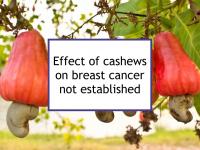Cashew nuts are the single seeds of the fruit of the cashew tree (Anacardium occidentale). Cashews contain significant levels of copper, iron, magnesium, manganese, and zinc, as well as some selenium. Cashews are also a source of vitamin E and some vitamin B6. Cashews have lower fiber and fat content than other nuts.
Much of the fat is in the form of oleic acid (an omega-9 fatty acid also found in olive oil). Cashew compounds have been shown to have antioxidant and anti-inflammatory properties. Habitual cashew consumption does not in and of itself appear to lead to weight gain.
Breast cancer-related effects of eating cashews
Anacardic acid is the best-known cashew compound with anti-cancer properties. However, anacardic acid is concentrated in the inedible shell of the cashew, not the nut.
Higher intake of tree nuts has been linked to lower breast cancer risk, and ER- breast cancer in particular, although not all studies are in agreement. However, no population studies have been performed specifically to assess possible associations between cashew consumption and breast cancer risk.
Relatively high copper content
Cashew nuts should be consumed in moderation since they contain relatively high levels of copper (approximately 0.63 mg per ounce), which could contribute to angiogenesis and metastasis of breast cancer, especially in women with inflammatory breast cancer (IBC) or triple negative (ER-/PR-/HER2-) disease. One 2024 study found that relatively high levels of copper in the urine of girls were associated with increased breast density two years after menarche. However, while copper appears to increase the risk of recurrence, it does not significantly heighten risk of primary breast cancer according to available evidence.
Although copper is a vital nutrient, women with breast cancer probably should not exceed the RDA (recommended dietary allowance) of approximately 0.9 mg unless they are anemic. High copper foods such as calf's liver and beef liver should be avoided. Foods with moderate copper content, such as shellfish, soy protein isolate, chocolate, most tree nuts, and sunflower seeds also should be limited or avoided. Copper intake should be reserved for foods with chemopreventive properties. For example, walnuts incorporate approximately 0.45 mg copper per ounce, but have exceptional anti-breast cancer properties.
Reasons for recommendation status
Foods are given the Different for different women recommendation status when they have varying effects on breast cancer based on breast cancer type, treatment or other factors. Cashew nuts have relatively high levels of copper, which has the potential to promote breast cancer, and therefore should limit their consumption. On the other hand, intake of tree nuts has been has been linked in population studies to lower breast cancer risk.
Additional comments
Cashew nuts are kidney-shaped seeds in hard shells that cling to the bottom of the cashew apple (the fleshy, red or yellow, pear-shaped fruit of the cashew tree), a native of Brazil. While cashew apples and their juice are consumed in Brazil and the Caribbean, they are very astringent and therefore more often used for jams, pickles, chutney, and wine. The interior of cashew shells contain a caustic resin (used commercially to make varnishes, plastics and insecticides) that must be removed before the nuts can be safely consumed. The leading producers of cashews for export to the U.S. are India, Vietnam, Brazil, and parts of Africa.
Sources of information provided in this webpage
The information above, which is updated continually as new research becomes available, has been developed based solely on the results of academic studies. Clicking on any of the underlined terms will take you to its tag or webpage, which contain more extensive information.
Note that while we are continually searching for new evidence specifically concerning this food, there is not much interest in cashews among breast cancer researchers, so few studies are available.
